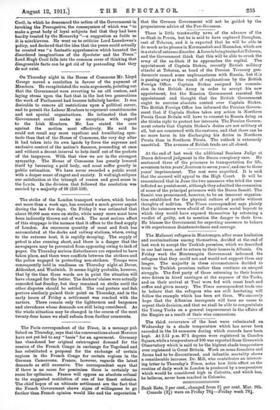The strike of the London transport workers, which broke out
more than a week ago, has assumed a much graver aspect during the last few days. On Friday it was estimated that about 80,000 men were on strike, while many more must have been indirectly thrown out of work. The most serious effect of this stoppage is the menace that it offers to the food supply of London. An enormous quantity of meat and fruit has accumulated at the docks and railway stations, where, owing to the extreme heat, it is rapidly decaying. The supply of petrol is also running short, and there is a danger that the newspapers may be prevented from appearing owing to lack of paper. On Thursday serious disturbances are reported to have taken place, and there were conflicts between the strikers and the police engaged in protecting non-strikers. Troops were consequently held in readiness on Thursday night at Dover, Aldershot, and Woolwich. It seems highly probable, however, that by the time these words are in print the situation will have changed for the better. The dockers' claims were actually conceded last Sunday, but they remained on strike until the other disputes should be settled. The coal porters and fish porters similarly gained their point on Thursday, and in the early hours of Friday a settlement was reached with the carters. There remain only the lightermen and bargemen and stevedores whose demands are still being considered. As the whole situation may be changed in the course of the next twenty-four hours we shall refrain from further comments.


































 Previous page
Previous page